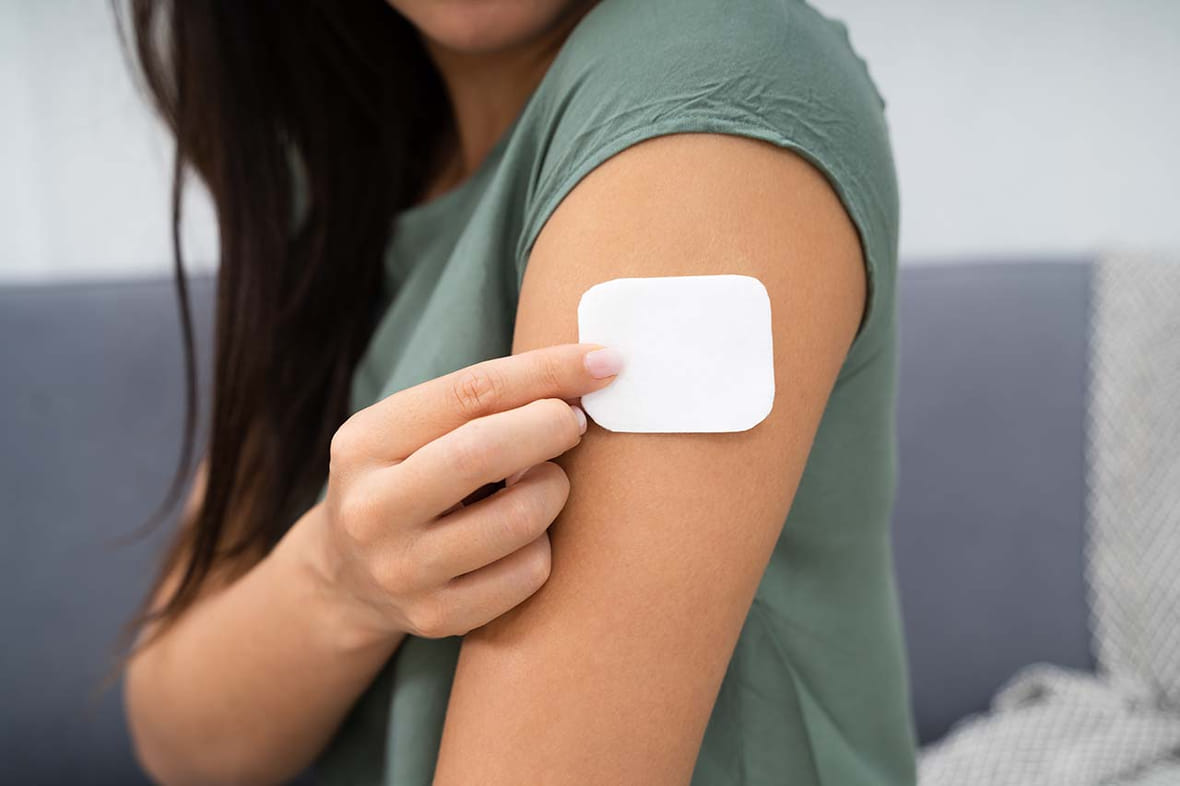Pregnancy is no longer left to chance. With contraception, it's possible to have sex without the risk of conceiving a child. There are many different types of contraceptives available, from regular birth control pills to emergency options like the morning-after pill, and non-hormonal methods such as condoms or the coil. Most contraceptive methods are intended for women. This text covers the various types of contraception and how they work.

Birth control
Consultation services
What is contraception?
Contraception is a way to prevent an unplanned pregnancy. Different methods are used to achieve this, with some contraceptives (barrier methods) preventing sperm from reaching the uterus, while others change the conditions in the female reproductive system to make pregnancy impossible.
What forms of contraception are there?
Contraception can be roughly divided into three categories: hormonal contraceptives, non-hormonal contraceptives, and permanent contraception (sterilisation).
What types of hormonal contraceptives are there?
The birth control pill, commonly known as "the pill," is one of the most widely used contraceptives. It works by using hormones to prevent ovulation. Most pills are "combination pills," containing both oestrogen and progestogen. These hormones stop the release of an egg and also alter the uterine lining, making it difficult for sperm to reach the uterus or for a fertilised egg to implant.
What types of contraceptive pills are there?
There are different types of birth control pills, which can sometimes cause confusion. The main types include:
- Single-phase pill: Each tablet in the pack has the same composition, with a consistent dosage of active ingredients. Pills with less than 30 mg of oestrogen are known as sub-30 pills, while those containing 30 to 50 mg are sub-50 pills. Lower oestrogen content can reduce the likelihood of side effects.
- Multi-phase pill: The hormone levels vary across the tablets to mimic the natural hormonal cycle, with different pill colours indicating the dosage changes.
- Mini pill: This contains only progestogen, making it lighter and less likely to cause side effects. It can also be used during breastfeeding.
How do you use contraceptive pills?
Birth control pills are highly effective when used correctly. Typically, one tablet is taken daily for three weeks, followed by a seven-day break during which withdrawal bleeding occurs. During this break, protection against pregnancy continues. Some pills do not require a break; you simply start the next pack right away.
The contraceptive effects wear off quickly after discontinuation, with fertility returning almost immediately.
Contraceptive pill for other purposes
Some women take the pill for reasons other than birth control, such as managing heavy periods, menstrual pain, or irregular cycles. The pill can replace natural menstruation with lighter, regular withdrawal bleeding, helping alleviate these issues. It can also be used to delay periods for convenience.
Emergency contraceptive pill or morning-after pill
The morning-after pill is different from regular birth control and is used to prevent pregnancy after unprotected sex. It contains hormones that delay ovulation or prevent a fertilised egg from implanting. It should be taken as soon as possible, ideally within 12 hours, but no later than three to five days after intercourse.
Other types of hormonal contraceptives
- Contraceptive injection: Provides protection for 12 weeks with one injection.
- Contraceptive implant: A small device placed under the skin releases hormones for up to three years.
- Contraceptive patch: The patch is worn on the skin and replaced weekly, with a break after three weeks.
- Vaginal ring: Inserted into the vagina for three weeks, releasing hormones locally.
- Hormone coil (IUD): This intrauterine device releases hormones and protects against pregnancy for up to five years.
What types of non-hormonal contraceptives are there?
Non-hormonal contraceptives are an alternative for those who prefer to avoid hormones. They include barrier methods and devices like the copper coil.
- Condom: The only non-permanent male contraceptive, also offering protection against STDs.
- Female condom: A bag-like device inserted into the vagina before intercourse.
- Pessary: A cap placed over the cervix, used with spermicide for added effectiveness.
- Copper coil (IUD): This device releases copper, which deactivates sperm, providing protection for five to ten years.
What is definitive contraception?
Permanent contraception is achieved through sterilisation, a surgical procedure meant for those who do not wish to have children in the future.
- Male sterilisation (vasectomy): Involves cutting the vas deferens to prevent sperm from entering semen.
- Female sterilisation: Seals off the fallopian tubes to stop eggs from meeting sperm.
Alternative method of contraception: periodic abstention
This method involves avoiding intercourse during the fertile period, using techniques to predict fertility.
- Temperature method: Tracks slight temperature changes around ovulation.
- Cervical mucus method: Observes changes in vaginal mucus consistency.
- Calendar method: Monitors cycle patterns to predict fertility.
What are the additional risks and side effects?
Each contraceptive carries its own risks and side effects.
What are the risks and side effects of hormonal contraceptives?
Hormonal methods may cause side effects like breakthrough bleeding, headaches, breast tenderness, weight gain, fluid retention, and mood swings. There is a slight increased risk of more serious conditions, such as blood clots and certain cancers.
What if you miss a dose of hormonal contraceptive?
Missing a dose, vomiting, or losing a patch may reduce the effectiveness. Follow instructions in the product leaflet for guidance.
Can you breastfeed when using hormonal contraceptives?
Hormonal contraceptives are not always suitable for breastfeeding women. Oestrogen-based contraceptives can reduce milk supply, so it is preferable to avoid them in the first six weeks postpartum. A mini pill containing only progesterone does not affect milk production and can be used while breastfeeding. Coils can also be used from four to six weeks after childbirth. Hormones may pass into breast milk, but this is not necessarily harmful.
What are the risks and side effects of non-hormonal contraceptives?
Non-hormonal options generally have fewer risks. The copper coil may cause heavier periods, and sterilisation carries typical surgical risks. Improper use of condoms or pessaries can reduce their effectiveness.
What are the risks and side effects of alternative methods of contraception?
Alternative methods like periodic abstention are less reliable than other contraceptives and require careful tracking.
Highly recommended
I have been a customer of Doctoronline for many years and have always found them reliable and professional in handling my orders.They provide an important service with quality products at reasonable prices with excellent customer service before, during and after sales.Highly recommended
Easy to navigate and prompt service.
Easy to navigate and prompt service.
Allways use as its so easy to fill in…
Allways use as its so easy to fill in the questionnaire Fast post Any questions you can ask the doctors I use them every month
I had consultation for acne issues
I had consultation for acne issues, resolved with no issues, saving me and the nhs time and money.
I have suffered with restless legs for…
I have suffered with restless legs for years and have never had any help from my doctor.Doctoronline prescribed some medication and I’m able to sleep without having that horrible feeling in my legs thank you I recommend 100% what ever your problem is they will do their best to help you
Very good service all round
Very good service all round, thank you.
Profesional help and fast delivery
Profesional help and fast delivery . High recommended
An excellent experience.
This was an excellent experience which actually surpassed my expectations.I required a medication fairly urgently and probably just a one off however I will have no hesitation in using the service again if need be.The service was exceptionally good, courteous and helpful. My meds arrived very rapidly and I was able to fully track the delivery progress which was via a well established courier company.Highly recommend.
Quick and straightforward assessment
Quick and straightforward assessment, easy to order, fast delivery service, ability to ask questions via email, regarding the medication you’ve ordered. The only thing I was slightly disappointed with, was when I made my second order on the medication I previously purchased, as the price went up by almost £10.
Great service
Fast, efficient service with no issues.
The best pharmacy online
The best pharmacy online
Very efficient service
Very efficient service. Made accessing healthcare and treatment easier than accessing GP services.
Easy to use and quick deliver
Easy to use and quick deliver
Excellent 1st class service
Excellent 1st class service. I could find the product I needed, placed the order, and after the swift consultation, the product was sent fast and securely. I would recommend.
Always reliable
Always reliable, smooth service. Happy with products and super fast delivery. 5 stars as always!
fantastic service from doctor online,my…
fantastic service from doctor online,my prescription was processed and delivered very quickly
No issues
No issues. Speedy service. Would use again
Genuine platform
I was skeptical to see another platform with doctors services as I was scammed in past.I have spoken to customer service multiple time( they answered all my concerns) and later on decided to place an order, my inquiry was dealt with it professionally, timely and accurate. I can recommend.
Good service and fast delivery
Good service and fast delivery
The medicine is helpful
The medicine is helpful



